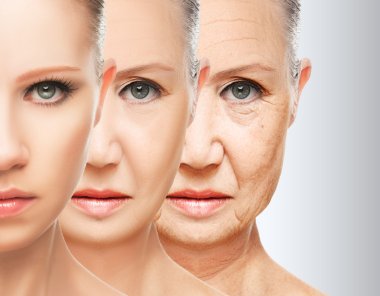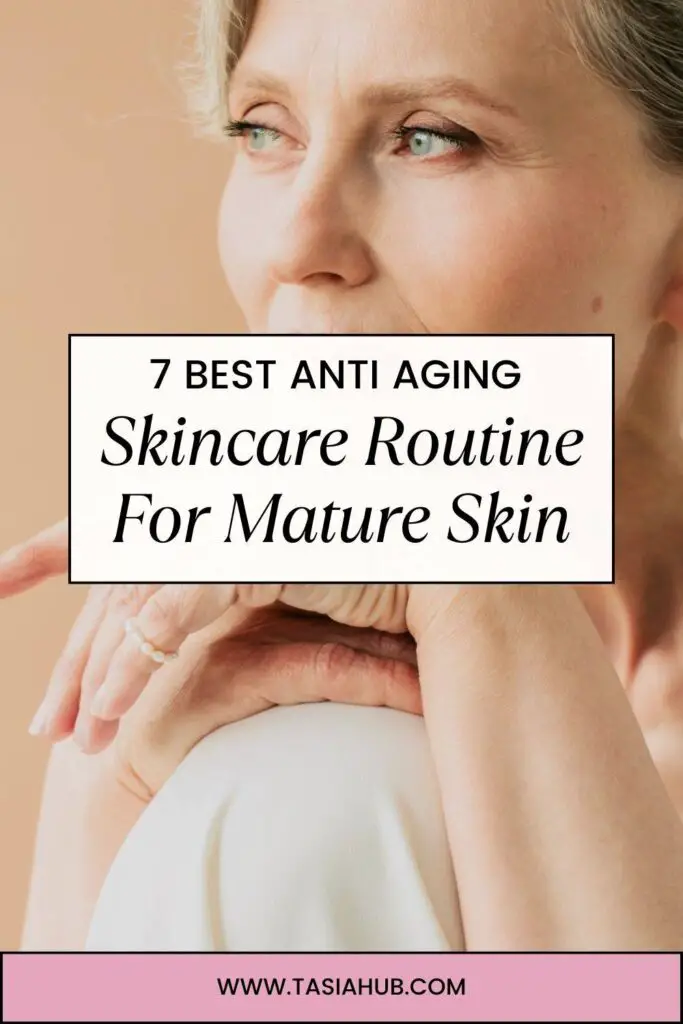Best 7 Anti-Aging Skincare Routine For Mature Skin

As we age, our skin goes through many changes like losing its elasticity, becoming drier due to decreased sebum production, producing less collagen, and developing fine lines and wrinkles.
In fact, studies have shown that your skin produces about 1% less collagen every year once you turn 20 years which makes the skin thinner and more fragile with age.
Mature skin can be difficult to care for, as it often requires different products than other skin types. Finding the best skincare products for mature skin can be a challenge, but it is worth it to find the right ones
If you’re looking for a skincare routine that’s tailored specifically for mature skin, you’ve come to the right place. In this blog post, we’ll discuss the best skincare practices for keeping your skin looking young and healthy.

Top Ingredients To Look Out For In Anti-Aging Products
- Vitamin C: Vitamin C is an antioxidant that will protect your skin from environmental pollutants and sun damage. Vitamin C also increases the production of collagen which helps your skin fight against wrinkles and signs of aging. Some skincare products contain vitamin C as an ingredient but it’s best to get a concentrated vitamin C serum for a more effective result. Vitamin C can be made less effective by light so make sure your vitamin C serum comes in an opaque container.
- Retinol: Another ingredient to look out for in your skincare products for mature skin is retinol, a vitamin A derivative. Retinol is a strong powerhouse anti-aging ingredient because of its exfoliating properties, it replaces old, dull skin cells with new shiny, and healthier skin and because it exfoliates the skin, it also unclogs pores and removes black and white heads from the skin. To top it all, retinol can help minimize wrinkles and fine lines by slowing down the breakdown of collagen, but be careful with retinol, it can cause irritation for people with sensitive skin.
- Vitamin E: Vitamin E can be used as an overnight treatment for anti-aging signs and wrinkles as it can reduce inflammation and make your skin look younger. Vitamin E has a thick consistency, so it’s best to apply it on the face overnight because putting makeup or any other product on it will be difficult.
- Collagen: Collagen is a substance our body produces naturally to strengthen the skin, increase skin elasticity, and increase skin hydration. Our body produces less collagen as we age which leads to dry skin, wrinkles, and other aging signs, many factors also contribute to a faster loss of collagen, these factors include excessive exposure to sun, alcohol, smoking, lack of exercise, and sleep.
- AHAs (Alpha Hydroxy Acids): AHAs like citric acid and glycolic acid are exfoliating ingredients used to exfoliate the skin and remove dead skin cells to improve skin texture, fade dark spots, and reduce visible signs of aging. Note that AHAs increase your skin sensitivity to sunlight, so make sure to wear a good sunscreen of at least SPF 50 to cancel sun damage.
7 Anti-Aging Skincare Routine For Mature Skin
Mature skin needs a different skincare routine than younger skin. Customizing your skincare routine to meet the specific needs of mature skin can help keep it looking healthy and youthful. Here are some tips for creating a skincare routine for mature skin:
1. Cleanse
Use a gentle, non-irritating cleanser twice a day to remove dirt, oil, and makeup. If you have visibly aging skin, it’s best to use cream cleansers instead of foam cleansers because cream cleansers tend to be more gentle on delicate skin.
As your skin ages, it loses collagen, nutrients, and moisture, using a cream cleanser will bring those lost moisture and nutrients back to the skin, giving your skin a whole new look.
Types Of Facial Cleanser For Skin Types:
- Dry Skin: Buy cleansers with cream or lotion formula with hydrating ingredients such as glycerin, ceramides, and hyaluronic acid.
- Oily Skin: Look for cleansers with a foaming or gel formula with ingredients such as niacinamide and salicylic acid that can help control and remove excess oil from the skin.
- Sensitive Skin: Try using micellar water, it is a very gentle cleanser that contains micelles that trap impurities and lift them away from the skin without drying it.
- Acne Prone Skin: Get a forming cleanser with acne-fighting ingredients such as salicylic acid, glycolic acid, or benzoyl peroxide.
2. Tone
A toner is used to restore the skin’s pH balance and remove any remaining dirt or makeup after cleansing, a toner can also be used to add moisture to the skin before going in with serums and moisturizers.
Types Of Toners For Skin Types:
- Dry And Sensitive Skin: Because your skin is dry, you will want to opt for a hydrating toner or essence that is alcohol-free and contains ingredients like glycerin and hyaluronic acid to add moisture to the skin.
- Oily Skin: Astringents such as alcohol or witch hazel are best for oily skin because they tighten pores since this is what oily skin needs to control oil on the skin.
- Acne Prone Skin: Look for toners that contain ingredients that increase cell turnover such as salicylic acid, hydroxy acid, and lactic acid.
3. Serum
Once you are done with the steps above, you are ready to apply serum that will directly treat your skin concerns like wrinkles or dark spots, if you have multiple skin concerns, feel free to use multiple serums if one serum can’t treat all of them.
Vitamin C serum is a great antioxidant and it helps increase the production of collagen which in turn fights off skin aging, your body naturally produces less collagen as you age which makes the skin saggy and wrinkled, using vitamin C can help the skin produce more collagen and minimize signs of aging.
4. Moisturize
Use a moisturizer every day to keep the skin soft and hydrated, hydrated skin is a healthy skin and healthy skin looks younger.
Choose a moisturizer that best suits your skin type and skin concerns, some moisturizers are formulated with additional anti-aging ingredients such as vitamin C, retinol, and ceramides, be sure to look out for these ingredients.
Always remember to apply your serum and moisturizer to your neck and chest area as well, these areas are more prone to showing signs of aging.
Types Of Moisturizers For Skin Types:
- Dry Skin: Look for a moisturizing cream rich with emollients, humectants, ceramides, and occlusives.
- Oily & Acne Prone Skin: Look for moisturizers with a lighter formulation, they are usually in a lotion or gel formula, and they are usually labeled “non-comedogenic” or “oily free”, not just for moisturizers, any product you are buying for your skin should have the above labels, it simply means that product won’t clog your pores and it doesn’t contain oil that would make your skin more oily.
- Sensitive Skin: Look for moisturizers that are hypoallergenic, fragrance-free, and alcohol-free to avoid skin irritation.
5. Sunscreen
Use sunscreen every day to protect the skin from the sun’s harmful UV rays. Exposure to UVA and UVB rays can lead to skin damage over time leading to premature aging and wrinkles, these UV rays affect not only a fair-skinned person but also a dark-skinned skinned.
There are two types of sunscreen and you should know which one works better on your skin. There are chemical and mineral or physical sunscreens, chemical sunscreens are formulated with chemical ingredients like avobenzone and homosalate while mineral or physical sunscreens are made with natural ingredients such as titanium dioxide and zinc oxide.
Mineral sunscreens usually leave a white cast on the skin, this type of sunscreen is not advisable to be used by people with dark skin tones, some brands are now beginning to formulate mineral sunscreens that won’t be leaving white cast on the skin.
6. Exfoliate
Exfoliating removes dead skin cells making way for newer, fresher, and brighter skin to appear, exfoliating is an important step in an anti-aging skincare routine. When looking for exfoliators, get finely ground physical exfoliators because this type of exfoliator works better for mature skin, oily skin, and combination skin.
However, if our skin is dry, sensitive, and acne-prone, chemical exfoliants like AHAs (Alpha Hydroxy Acids) will work best for you.
There are numerous benefits of exfoliating the skin and some of them include:
- Removing dead skin and dirt.
- Even out skin tone.
- Helping serum and moisturizer absorption.
Exfoliate 1-3 times a week depending on your skin type, if you have oily skin, exfoliating two or three times a week will do great for your skin, on the other hand, people with normal and combination skin can do well with exfoliating once a week.
7. Eye Cream
Eye creams are different from face creams or moisturizers, eye creams are formulated to target and work on the areas around the eyes which age faster than the rest of the face.
You can use eye creams to treat certain skin concerns such as eye bags, dark circles, or wrinkles, and be sure to massage the product lightly into the skin to avoid causing more damage to your delicate skin.
See a dermatologist if you have any specific concerns about your skin.
Thanks for reading! We hope this blog post has helped you create a skincare routine that’s perfect for your mature skin.
